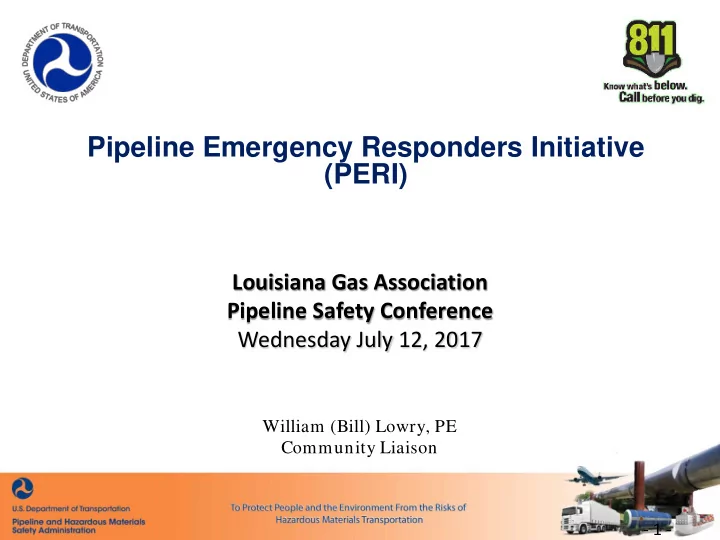

Pipeline Emergency Responders Initiative (PERI) Louisiana Gas Association Pipeline Safety Conference Wednesday July 12, 2017 William (Bill) Lowry, PE Community Liaison - 1 -
Overview • What is PERI? • Why is PERI needed? • How did PERI get started? • Where are we now? • Where do we go from here?
What is a Pipeline Emergency Responders Initiative (PERI)? Public-private partnership among emergency response organizations and pipeline operators to improve emergency response.
What Do We Want to Accomplish with PERI? Enhance responders understanding of pipeline risks and hazards; Strengthen relations in the interest of public safety; Improve management of pipeline emergencies nationwide
Regulatory Requirements Emergency Plans - 192.615 and 195.402 • Written procedures for notifying appropriate fire, police, and other public officials of gas and liquid pipeline emergencies • Establish and maintain liaison with appropriate fire, police, and other public officials Public Awareness - 192.616 and 195.440 • Messages to emergency responders and public officials
Drivers for Change in GA Some firefighters JULY 2010 Meeting of GPSC, Increased industry squeezing off gas lines GA Association of Fire Chiefs: focus on when ruptured in No firefighter involvement effectiveness of ER AGLR footprint. Need on the issues affecting them training & liaison to change behaviors 2007 2008 2009 2011 2012 2010 SEPTEMBER 9, 2010 MARCH, 2008 MAY 15, 2012 First- San Bruno:“What pipeline?” GA Public Service ever Commission issues Final GA Pipeline Operators Are GA firefighters Rule: County-wide Gas & Emergency adequately informed? Safety Plans to reduce Responder Meeting confusion/ duplication of efforts 6
May 15, 2012 Meeting in Sandy Springs Hosted by Sandy Springs Fire Chief Jack • McElfish Over 50 attendees • Steering Committee formed • Local media coverage •
Steering Committee Members Fire Departments • Georgia Association of Fire Chiefs (GAFC) • Georgia State Fire Fighters Association (GSFFA) • Georgia Emergency Response Agencies Georgia State Fire Marshall’s Office • Georgia Emergency Management Agency (GEMA) • Georgia Forestry Commission (GFC) • Georgia Public Safety Training Center (GPSTC) • Georgia Municipal Association (Gas Section) • Georgia Pipeline Companies Municipal gas systems • Interstate pipeline operators (gas and liquids) • Intrastate pipeline operators (gas) • Georgia Public Service Commission (GAPSC) • State and Federal Regulators Pipeline and Hazardous Material Safety Administration (PHMSA) •
GPERI Mission Statement Advance the ability of Georgia emergency responders to manage pipeline emergencies through improved training, cooperation and communication with pipeline operators
Goals and Objectives of PERIs Improve and sustain effective communication among emergency responders and pipeline operators Increase emergency responders’ awareness of pipelines in their jurisdictions Establish a baseline to evaluate pipeline emergency response preparedness Identify weaknesses in existing regulatory and emergency response programs and develop solutions Develop a sustainable comprehensive pipeline emergency response training program
Alternative Responder Training Pipeline emergency training transferred to fire- based training services Enhances credibility Maximizes emergency responder participation Recognition of specific knowledge needs of responders Eliminates one-size-fits-all approach to training
Training Tailored to Rank and Position Course Position/Rank Content Train the Trainer Hazmat teams, command In-depth focus on pipeline emergencies; 16-hour officers, trainers instructor qualification Law enforcement, EMS, Provides strategic awareness; Focused emergency managers, fire on NIMS & ICS, unified command, Command Module chiefs Incident Action Plan, pre-planning for 4-hour incidents Rank & file firefighters Focused on scene safety, initial incident Company Officer & (volunteer or paid) command, size-up, prompt notification Firefighter Module of operator, assistance requests, 8-hour ordering of resources E-911 operators Provides detailed information on pipelines in jurisdiction, product risks 911 Dispatch Module and hazards, questions to ask when 4-hour pipeline emergency reported, what to communicate to operators & ERs
Tim Butters Addressing Georgia Fire Chiefs
Colonial Pipeline Display
GPERI Emphasis on Prevention • Response important, but prevention saves lives • Damage Prevention content incorporated into “Pipeline Emergencies” course o Role & importance of 811 o Underground utility locating process o Excavation awareness (how to tell if a line has been located at a working job site)
Ensuring Sustainable Funding For the program to be a long term solution, it must have a sustainable funding stream. Pipeline operators spend significant dollars today to meet regulatory requirements associated with liaison requirements and public education. Let’s Spend Them Smarter … 20
Status of PERIs
PERI Logos www.phmsa.dot.gov/pipeline/safety-awareness-and-outreach/PERI
Challenges Moving Forward with PERI Providing sustainable pipeline safety training for ERs Overcoming low priority placed on pipeline emergencies training Key emergency responder participation Meeting logistics Increased demands on time of ERs Establishing baseline to measure progress Establishing entity and funding to sustain program
PERI Assistance $300,000 interagency/intra-agency agreement with VOLPE – executed August 23 rd VOLPE – The National Transportation Systems Center – Cambridge, MA
https:/ / www.phmsa.dot.gov/ pipeline/ safety- awareness-and-outreach/ PERI
Why will PERIs Succeed? BECAUSE EVERYONE BENEFITS 26 26
Louisiana PERI Kickoff Meeting Thursday, August 31, 2017 Louisiana State Police Training Academy Auditorium 8181 Independence Blvd. Baton Rouge, Louisiana 70806
Thank you. William (Bill) Lowry, PE Community Liaison bill.lowry@dot.gov http:/ / phmsa.dot.gov/ pipeline
Recommend
More recommend